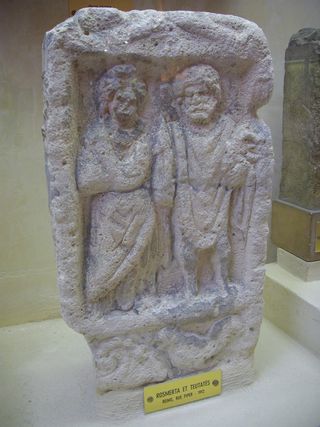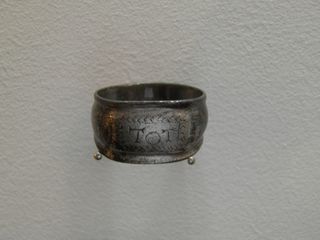テウタテス

テウタテス (TeutatesまたはToutatis) は、ケルト人に信奉されていた神[1][2][3][4]で、主に古代ガリアとブリテンで崇拝された(後述)[5]。テウタテスの名前は「部族の神」を意味し[3]、部族の守護神として広く解釈されてきた[2][6]。ローマの作家ルカヌスによれば、ガリア人はテウタテスに人身御供を捧げたという[1]。ルカヌスの『内乱』やラクタンティウスの『神的教理』で名前が言及されており、またカエサルが『ガリア戦記』内で言及したガリアの神の中の一柱だとされる。テウタテスに献じられた石碑なども多く発見されており、その広い信仰を示している。言語学や考古学による研究からテウタテスは部族の神であり、また戦争の神でもあったとされる。
名前と性質
ガリア語で[towˈ]と発音するトゥータティス(Toutatis)[7]とその変種のトゥーテーツ(Toutates)[1]、トゥーテーツ(Teutates)、トゥータタス(Tūtatus)、トゥートリックス(Toutorīx)[5]はガリア人のケルト語源で「部族」「人々」を意味するトゥーターに由来する(古アイルランドのトゥアスやウェールズのトゥードを比較)[5]。文字通りテウタテスの意味は、「部族の神」であるだろう[3]。
Toutatis (pronounced テンプレート:IPA-cel in Gaulish) and its variants Toutates, Teutates, Tūtatus and Toutorīx, comes from the Gaulish Celtic root toutā, meaning 'tribe' or 'people' (compare Old Irish tuath and Welsh tud). A literal meaning would thus be "god of the tribe". A similar phrase is found in Irish mythology, which mentions the oath formula tongu do dia tongas mo thuath, roughly "I swear by the god by whom my tribe swears".[5] Bernhard Maier proposes that his name derives from an older *teuto-tatis, with the meaning 'father of the tribe', although he notes that this etymology is uncertain.[1]
It is believed Toutatis was a title for the tutelary gods of various tribes.[5] Miranda Aldhouse-Green suggests that Toutatis was an epithet or description for Celtic tribal protector-gods, rather than a name.[2] Paul-Marie Duval suggests that each tribe had its own Toutatis; he further considers the Gaulish Mars the product of syncretism with the Celtic Toutatis, noting the great number of indigenous epithets under which Mars was worshipped.[6]
Evidence
Inscriptions
Inscriptions dedicated to him have been found in Gaul (e.g. at Nîmes and Vaison-la-Romaine in France, and Mainz in Germany),[5] in Britannia (e.g. at York, Old Carlisle, Castor and Hertfordshire),[5][8] in Noricum, and in Rome,[5] among other places.[9] Some of these inscriptions combine his name with other gods such as Mars, Cocidius, Apollo, and Mercurius.[5]
Written evidence
Toutatis is one of three Celtic gods mentioned by the Roman writer Lucan in his epic poem De Bello Civili or Pharsalia.[2][3] Written in the first century AD, it names Toutatis, Taranis and Esus as three gods to whom the Gauls offered human sacrifices.[1][5][3] In the 4th century commentary on Lucan, Commenta Bernensia, an author added that sacrifices to Toutatis were killed by drowning, and likened Toutatis to Mars or Mercury.[1]
In his third-century work Divinae Institutiones, Roman writer Lactantius also names Toutatis as a Gaulish god to whom sacrifices were offered.[1]
TOT finger rings
A large number of Romano-British finger rings inscribed with the name "TOT", thought to refer to Toutatis, have been found in eastern Britain, the vast majority in Lincolnshire, but some in Bedfordshire, Nottinghamshire and Leicestershire. The distribution of these rings closely matches the territory of the Corieltauvi tribe.[10] In 2005 a silver ring inscribed DEO TOTA ("to the god Toutatis") and [VTERE] FELIX ([use this ring] happily") was discovered at Hockliffe, Bedfordshire. This inscription confirms that the TOT inscription does indeed refer to the god Toutatis.[11]
In 2012 a silver ring inscribed "TOT" was found in the area where the Hallaton Treasure had been discovered twelve years earlier. Adam Daubney, an expert on this type of ring, suggests that Hallaton may have been a site of worship of the god Toutatis.[12]
See also
Further reading
- Clémençon, Bernard; Ganne, Pierre M. "Toutatis chez les Arvernes: les graffiti à Totates du bourg routier antique de Beauclair (communes de Giat et de Voingt, Puy-de-Dôme)". In: Gallia, tome 66, fascicule 2, 2009. Archéologie de la France antique. pp. 153–169. [DOI: https://doi.org/10.3406/galia.2009.3369] ; www.persee.fr/doc/galia_0016-4119_2009_num_66_2_3369
- Lajoye, Patrice; Lemaître, Claude. "Une inscription votive à Toutatis découverte à Jort (Calvados, France)". In: Etudes Celtiques, vol. 40, 2014. pp. 21–28. [DOI: https://doi.org/10.3406/ecelt.2014.2423] ; www.persee.fr/doc/ecelt_0373-1928_2014_num_40_1_2423
- M. Almagro‐Gorbea, A. J. Lorrio Alvarado, Teutates: el héroe fundador, Madrid, Real Academia de la Historia, 2011
概要
ケルト神話には汎ケルト的に広く信仰されていた神もあったが一方でケルト内の部族ごとの神も存在した。
例えば、アルウェルヌス(Arvernus)はその名からアルウェルニ族固有の神であった事が容易く想像できる。こうした神は過去の族長が神格化された、一種の祖先崇拝の対象と考えられる[13]。
テウタテスは「民族の神」を意味する。意味から推測するとテウタテスという名はアルウェルヌスのような部族の神のうち特定の一柱を指す呼び名であったのかもしれない。しかしテウタテスと呼ばれる神への信仰を示す証拠は非常に広範囲に分布しており[14][15]、こうした解釈は実状にそぐわない。テウタテスとは元々は神の名ではなく、単に「民族の神」という普通名詞、あるいは部族の神に用いる尊称であったと複数の学者が推測している[16]
「部族を意味するケルト語の派生語のテウター、その名は『部族の神』を実際に意味したのだと。」「テウターテスは、のちにだんだん推移していったにしても、元は固有名というよりも説明のための用語だったのである。」[17]
「これは『部族の神』という意味で、おそらく一つの神の名称というよりも、多くの異なる神の尊称だったのだろう。」[18]
「その名は『部族』を意味するteuta,touta,totaに由来する.おそらく『部族の(神)』という普通名詞だろう[19]。」こうした説に倣えばテウタテスについての記述は、テウタテスその物ではなく、テウタテスと呼ばれた別々の部族の神に対してのものであったと考えられる[20]。
ローマ的解釈
ガリア人の信仰について、カエサルは以下のように説明している。
神々の中ではメルクリウスを最も崇拝する。その像も一番数が多く、種々なわざを工夫したものと信じ、旅行者を導くもの、富の獲得や商売に大きな力を持つものと思っている。これに次ぐのはアポローやマルスやイゥピテルやミネルウァである。それについては他の人々と同じような考え方をしている。アポローは病気をはらい、ミネルウァは仕事やわざの手ほどきをし、イゥピテルは大空を支配し、マルスは戦争をつかさどる。戦争しようとする時にはその戦争の獲物をこの神に捧げる。勝てば捕まえた動物を犠牲にし、他の獲物を一箇所に集める。これらの物を積み重ねた山が多くの部族では神聖な場所に見られる。(空引数, カエサル, ガリア戦記)[21]
カエサルの説明を言葉通りに受け取れば、ガリア人はローマ人と同様に「メルクリウス」や「アポロー」といった神々を信仰していたように見えるが、これは正しくない。カエサルはガリア人の神を指して、それに近い性質をもつローマの神の名前を使用する事でローマ人への説明を行っている。こうしたローマ人による他の民族の神の捉え方をローマ的解釈(Interpretatio Romana)と呼ぶ。カエサルが挙げた神の中で「マルス」がテウタテスを指すものと考えられており[22][23]、そうだとすれば続く戦の神に捧げた儀式についての記述もテウタテスへのそれを説明した物という事になる。
テウタテスとマルスとの対応は固定的なものではなく、ローマによるガリア平定後に作られた石碑の碑文にはテウタテスはマルス[24]だけでなくメルクリウス[25]とも同一視された事が示されている。後述する『コメンタ・ベルネンシア』においても、テウタテスはマルスともメルクリウスとも同一視されている[26]またトウティオリクス(Toutiorix)をテウタテスの異形であると見なすのであれば[27]、アポロとも同一視された事になる[28]。しかしテウタテスはメルクリウスやアポロよりもマルスとの同一視を示す証拠が多い。
人身御供の儀式
ルカヌスは『内乱』においてテウタテスをエススやタラニスと共に人身御供を要求するガリアの神の一つとして挙げている。
酷烈のテウタテス神がおぞましい(人身御供の)血で、また恐るべきエスス神が野蛮な祭壇で鎮められ、スキュティアのディアナに劣らず過酷なタラニス神の祭壇が祀られる地の部族も然り。また、汝ら、歌人として、戦に斃れた雄々しい英霊を末永く未来に歌い伝える者たち、バルディ[29]よ、汝らも心安らかに数多の歌謡を歌った。また、ドルイダエ(druid)、汝らも、武器を置き、蛮族の習いの、聖なる儀式へと戻っていった。(空引数, ルカヌス, 内乱, 2012)
『内乱』その物にはこれ以上の記述はないが、四世紀から九世紀の間に書かれた『内乱』に対する古注を一つに集積した『コメンタ・ベルネンシア(Commenta Bernensia)』はこの人身御供に関する儀式により詳細に触れている。これによれば(メルクリウスと同一視された)テウタテスへは、水を満たした釜に人間を逆さに突っ込んで溺死させるという方法で生贄を捧げたとある。
グンデストルップの大釜には『コメンタ・ベルネンシア』が示した、釜を使った溺死による生贄の儀式を示したとも解釈できるプレートがある。歩兵と騎兵が行進しているためプレートが描いているのは戦いの儀式であると思われる。プレートの左端には神と解釈できる巨人[30]が大釜の上に人をぶら下げている。このプレートが描いているのがケルトの戦いの儀式であり、巨人をテウタテスであると解釈するのであれば、テウタテスが戦いの神の性質を持つことを示す一つの根拠になる。ただしグンデストルップの大釜には様々な解釈が成立し定説がない。歩兵が儀式を行う神へと行進し、騎兵はその逆に行進していることに注目するのであれば、これは生贄ではなく、戦争の前に騎兵に施した儀式とも考えられる。そもそもケルト由来の物ではないとする説もある。
関連項目
参考文献
- Wikipedia:テウタテス(最終閲覧日:22-11-21)
- カエサル, 近山金次, ガリア戦記, 岩波書店, 1968
- ギリー・シェリダン, ウィリアム・J・シールズ, イギリス宗教史 前ローマ時代から現代まで, 2014, isbn = 978-4-588-37122-6, 法政大学出版局
- コットレル・アーサー, 松村一男、蔵持不三也、米原まり子, ビジュアル版 世界の神話百科 ギリシア・ローマ ケルト 北欧, 原書房, 1999, isbn:4-562-03249-9
- ジェームズ・サイモン, 井村君江、吉岡晶子、渡辺充子, 図説ケルト, 2000, 東京書籍, isbn:4-487-79411-0
- 鶴岡真弓, 松村一男, 図説 ケルトの歴史, 1999, 河出書房, isbn:4-309-72614-3
- cite encyclopedia, language:ja, 2001, 世界神話大事典, 大修館書店, デュヴァル・ポール=マリー, Paul-Marie Duval, イヴ・ボンヌフォワ, isbn:4-469-01265-3
- ピゴット・スチュワート, Stuart Piggott, 鶴岡真弓, ケルトの賢者 「ドルイド」, 講談社, 2000, isbn:4-06-209416-9
- マイヤー・ベルンハルト, Bernhard Maier (Religionswissenschaftler), 鶴岡真弓、平島直一郎, ケルト辞典, 創元社, 2001, isbn:4-422-23004-2
- マッカーナ・プロインシァス, Proinsias MacCana, 松田幸雄, ケルト神話, 青土社, 1991, isbn:4-7917-5137-X
- ルカヌス, 内乱 : パルサリア, 上, 2012, 岩波書店, isbn:978-4-00-321261-5
参照
- ↑ 1.0 1.1 1.2 1.3 1.4 1.5 1.6 Bernhard Maier, Dictionary of Celtic Religion and Culture, 1997, Boydell & Brewer, page263-264, isbn:9780851156606, Teutates (later form: Toutates). Name of a Celtic god [...] T. is mentioned by the Roman authors Lucan (Pharsalia 1,444-446) and Lactantius (Divinae Institutiones 1,21,3). According to Lucan the Gauls made human sacrifices to him. The Berne Scholia, commenting on Lucan, add that the victims were put head-first in a tub full of water and thus drowned... , https://books.google.com/books?id=7AvdTqwucfwC&dq=Teutates&pg=PA263
- ↑ 2.0 2.1 2.2 2.3 Miranda Aldhouse-Green, The Gods of the Celts, 1986, Sutton Publishing, page110, isbn:9780752468112, What the Romans may have met in Celtic lands are tribal protector-gods with a war-role. In this connection Lucan's comment on Teutates, who was one of three Celtic gods said to have been encountered by Caesar's army in Gaul, may be relevant..., https://books.google.com/books?id=vSg7AwAAQBAJ&dq=The+Gods+of+the+Celts+Teutates&pg=PT84}}
- ↑ 3.0 3.1 3.2 3.3 3.4 Barry Cunliffe, The Ancient Celts, 2018, 1997, Oxford University Press, page275, 2nd, Chapter 11: Religious systems, isbn:978-0-19-875292-9 , Lucan, who, in Pharsalia, names three Celtic deities, Teutates, Taranis, and Esus. All were propitiated by human sacrifice: the victims of Teutates were to be drowned, those of Taranis burnt, and those sacrificed to Esus hanged. The Celtic names are informative. Teutates means 'the god of the tribe' from the Celtic teutā 'tribe'..., https://books.google.com/books?id=vqZTDwAAQBAJ&dq=Teutates&pg=PA275
- ↑ Euskirchen Marion, Teutates, 2006, Brill's New Pauly: Encyclopaedia of the Ancient World, Brill Publishers, https://referenceworks.brillonline.com/entries/brill-s-new-pauly/*-e1205840 , doi:10.1163/1574-9347_bnp_e1205840, Celtic god, who, along with Esus and Taranis (according to Lucanus 1,443-446), was allegedly worshipped by human sacrifice.
- ↑ 5.0 5.1 5.2 5.3 5.4 5.5 5.6 5.7 5.8 5.9 John T. Koch, Celtic Culture: A Historical Encyclopedia, 2006, ABC-CLIO, page1665, Teutates (also Toutatis, Tūtuates, Tūtatus, Toutorix), Taranis, and Esus form Lucan's trinity of Gaulish gods (Pharsalia 1.444–6) to which Gauls near Massalia sacrificed their prisoners of war. The name Teutates occurs alone or as a secondary theonym in combination with Mars, Apollo (see Belenos), and Mercurius in texts and inscriptions, including sites now in Austria, England, France, Germany, and Italy...
- ↑ 6.0 6.1 Paul-Marie Duval (1993). Les dieux de la Gaule. Éditions Payot, Paris., ISBN:2-228-88621-1
- ↑ Pierre-Yves Lambert (2003). La langue gauloise. Éditions Errance, Paris.
- ↑ Collingwood, R.Gh. and Wright, R.P. (1965) The Roman Inscriptions of Britain (RIB) Vol.I Inscriptions on Stone. Oxford. RIB 1017, online at romaninscriptionsofbritain.org
- ↑ Listing for Toutatis from www.arbre-celtique.com.
- ↑ Missing Link To Bloodthirsty Ancient Celtic Warrior God Uncovered.16 July 2007 - via {{{via}}}.
- ↑ Record ID: BH-C3A8E7 - Roman finger ring.3 November 2007 - via {{{via}}}.
- ↑ Rare silver ring unearthed near site of Hallaton hoard.7 August 2012 - via {{{via}}}.
- ↑ アルウェルヌスの別名であるアルウェルノリクスは「アルウェルニ族の王」を意味する。ピゴットはガリア人の「王(rix)」について「その多くは『取るに足らない侵略集団の族長で、互いの領地を荒らし回り、隷属民を食い物にするだけの存在だった』」としている(ピゴット, 2000, page92)。
- ↑ 「テウタテスは文献からはガリアで,ラテン語碑文からは英国,ドナウ川沿岸,さらにはローマまで,グンデストルップの大釜からはこの文化遺品の原産地と思われる黒海沿岸でもおそらく,知られていたことが分かる.」(デュヴァル, 2001)
- ↑ 『アルスター神話群』に登場する「我が部族が忠誠を誓う神」がテウタテスに相当する神だとする指摘もあり(デュヴァル, 2001)、そうだとするとアイルランドにおいてもテウタテスの信仰は広まっていた可能性がある。
- ↑ 「名前は『部族』を意味するテウタ(teuta,touta,tota)に由来し、『部族の神』という普通名詞かもしれない。」(鶴岡, 1999, page88)
- ↑ マッカーナ, 1991, pages38,57
- ↑ ジェームズ, 2000, page151
- ↑ デュヴァル, 2001, page666
- ↑ コットレル, 1999, page263
- ↑ カエサル, 1968. page=200
- ↑ 鶴岡, 1999, page=88-89
- ↑ 「各種碑文を証拠に考えるのならマルスと同じ神とするのが正しい.」「だとしたら、テウタテスはマルスと同じ神である可能性が強くなろう.」(デュヴァル, 2001)
- ↑ Marti Toutati Ti(berius) Claudius Primus Attii liber(tus) v(otum) s(olvit) l(ibens) m(erito)
I(ovi) O(ptimo) M(aximo) et Riocalat(i) [To]utat(i) M-[ar(ti)] Cocid(i)o [vo]to feci-[t] Vita-[lis] - ↑ Mercur(io) / IOTOUVI[1]E / [3]OEIRNV / OAIRONIS ;
Merc[urio] / Tou[teno] / temp[lum] / cum [signo] / et orn[amentis] / Virili[s pos(uit)] / v(otum) s(olvit) [l(ibens) l(aetus) m(erito)]. - ↑ ガリアにおいてマルスとメルクリウスは性質の近い存在であったと考えられている(マッカーナ, 1991, page36)。イオウォントゥカルス(Iovantucarus)もマルスとメルクリウスの両方に同一視されている。またヘニッグはアレイで信仰されていた名前の失われたケルトの戦の神が、(戦の神であるマルスではなく)メルクリウスと同一視されていた事を示している。(ギリー, 2014, page18)
- ↑ マイヤーは 『ケルト辞典』においてテウタテスとトウティオリクスで別項を立てている(マイヤー, 2001, pages154,157。
- ↑ In h(onorem) d(omus) d(ivinae) / Apollini Tou/tiorigi / L(ucius) Marinius / Marinia/nus |(centurio) leg(ionis) VII / Gem(inae) [[Alexan]]/[[d[r]ianae]] vo/ti compos
- ↑ バルディはバード、ドルイダエはドルイド。バードやドルイドへの言及があるのは彼らがテウタテスらへ捧げる人身御供の儀式に関わっていた、あるいは少なくともルカヌスはそう考えていた事を示す。
- ↑ 「押さえつける方は,その身長から見て,戦争の神自身に違いない.」(デュヴァル, 2001, page628)
- ↑ Petiganus / Placidus / Toutati / Medurini / votum sol/vet(!) anni/versarium
- ↑ マイヤー, 2001, page154
